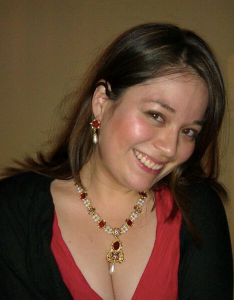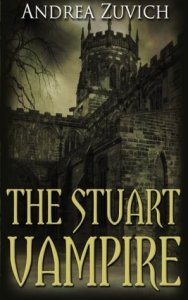 Andrea Zuvich is visiting me today to talk with me about her book, The Stuart Vampire and about the period in history she focuses on. Andrea is a seventeenth-century historian specialising in the House of Stuart (1603–1714), as well as a historical advisor and author of historical fiction. She is the host of the popular ‘The Seventeenth Century Lady’ blog. She has degrees in History and Anthropology. Zuvich has appeared on television and radio discussing the Stuarts and gives lectures on the dynasty throughout the UK. She was one of the original developers of and leaders on the Garden History Tours at Kensington Palace. Zuvich, a Chilean-American born in Philadelphia, Pennsylvania, now lives in England with her husband.
Andrea Zuvich is visiting me today to talk with me about her book, The Stuart Vampire and about the period in history she focuses on. Andrea is a seventeenth-century historian specialising in the House of Stuart (1603–1714), as well as a historical advisor and author of historical fiction. She is the host of the popular ‘The Seventeenth Century Lady’ blog. She has degrees in History and Anthropology. Zuvich has appeared on television and radio discussing the Stuarts and gives lectures on the dynasty throughout the UK. She was one of the original developers of and leaders on the Garden History Tours at Kensington Palace. Zuvich, a Chilean-American born in Philadelphia, Pennsylvania, now lives in England with her husband.
Hi, Andrea! Thank you for chatting with me today about your book, The Stuart Vampire. Tell me a little about the premise.
Thank you for having me on this great site! The Stuart Vampire follows the brief life of Henry Stuart, Duke of Gloucester, who was the youngest son of King Charles I (and therefore the youngest brother of King Charles II). Henry historically died from smallpox when he was twenty, and my story takes a decidedly paranormal turn from that point on and takes us along on Henry’s journey as he copes with his forced transformation into a vampire and he embarks on a mission to try to make something good out of this horrible curse. Along the way, he meets Susanna, the shocking inhabitants of the isolated village of Coffin’s Bishop, Sebastian (originally a mediaeval stonemason), among others.
Why 17th Century?
For me, the seventeenth century has it all and is yet grossly overlooked by both readers and authors (though I’m pleased to say I’ve seen a steady surge in interest from both in the past couple of years). The century was pretty controversial and one can still get heated arguments about topics from that time (i.e. whether or not it was lawful to execute King Charles I, what we should call the English Civil Wars, if we should recognize William and Mary as true sovereigns or usurpers… the list goes on and on). I love the aesthetics of this time period as well – the Baroque style is sometimes criticised for being over-exuberant and outrageously flamboyant – but I love it as, to me, it’s stunning and unashamed of displaying the gamut of human emotion.

Tell me a little about Charles II.
Ah, Charles II, hands-down the most popular of the Stuarts. Often called the “Merry Monarch”, he is best remembered for his rather prolific love life and for the Great Fire of London rather than for the political events during his reign – which included the Popish Plot of the 1670s, the Rye House Plot of 1683, the Secret Treaty of Dover with Louis XIV of France, etc. Charles II appears occasionally in The Stuart Vampire because he was an important figure in Henry’s life.
What are the emotional triggers of Contessa Griselda di Cuorenero and how does she act on them?
Griselda is the main antagonist of the book. Her biggest flaw is her obsession with her looks. She’s been fortunate to have beauty, but naturally this fades with time and it is the lengths to which she’ll go to in order to maintain this beauty that shows the depths of her vanity and evil. I can’t comment any further without giving anything away!
What is the courage and strengths of Henry Stuart? -and possibly the isolation he may feel with these attributes.
Henry has a strong sense of morality, and I think this is his strongest point. When he is around Griselda, she is a despicable individual and he knows he does not want to be like her. His longing to maintain his humanity is touching but at the same time makes him lonely. His devotion to and love for Susanna is another strength, and it’s the same for her. After a secret is revealed, Susanna tells Henry that “Our love will be the light and the darkness shall perish beneath the weight of it” – and that’s the strength of their relationship in a nutshell.
How is your character(s) influenced by their setting?
At one point, Henry leaves London and goes into the countryside, which does influence him – I think characters, like real people, do get influenced by their surroundings and those who surround them. The town of Coffin’s Bishop is a negative influence on Susanna, who does need to get away from that horrid place just for some peace of mind.
What is the greatest challenge of writing a story with Vampires in it?
Believability, especially from those who know me as a more serious historian. Most of my days are spent writing nonfiction history, but I’m very keen on making history accessible to as many people as possible as I don’t think it should only be for the academic community. When some people hear that I’ve written “a vampire story” they have a rude tendency to roll their eyes and/or chuckle, but the fact is, this story has made Henry Stuart known to a lot more people – people who have subsequently gone on to read more about the Stuarts, the English Civil Wars, the seventeenth century, and so on. I had one teenager contact me saying that solely because of The Stuart Vampire, she decided to get books about the Stuarts from her library to learn more about them – which is great! And that’s certainly nothing to snigger about.
Where can readers buy your book?
The Stuart Vampire is available in both paperback and eBook formats on Amazon, iBooks, Google Books, signed copies are available through my website, and the book will soon to be released as an audiobook on Audible. My other books are also available in these formats, but the two nonfiction books, A Year in the Life of Stuart Britain (hardback, 2016) and The Stuarts in 100 Facts (paperback, 2015) can be bought from any good bookseller.
Please tell me about yourself as an Historian.
History has been a very important aspect of my life since I was a little girl. I remember I was in the fourth grade and I knew I wanted to be a historian. I went to a community college during high school and then got my AA in History, and then I went to the University of Central Florida where I obtained two BA degrees – one in History and the other in Anthropology. After this, I got married and moved to the UK, and continued my history studies with Oxford University and Princeton University. That being said, there was absolutely no better training for me than actually delving into archives around the world – handling documents from the seventeenth century brought the history to life in ways that could never be done in a classroom. Indeed, by the time I had finished studying history in university, I was burned out, I almost couldn’t stand it anymore as formal study and the somewhat politically biased teaching wasn’t right for me. I had time off and fell in love with history again, by self-teaching with primary sources. Whilst living in London, I volunteered at Kensington Palace and later was one of the creators and leaders on their Garden History Tours, which was a very enlightening experience for me. Since 2010, I’ve run The Seventeenth Century Lady website which is devoted to all things seventeenth-century, with an emphasis on European history. I’ve been giving lectures on the Stuart period of 1603-1714 for several years now, and it’s a delight to do so.
Will you write other stories related to the paranormal?
It’s funny because I was never before interested in paranormal stories until The Stuart Vampire. That being said, I’ve had numerous readers who have responded favorably to this and many have asked for a continuation of Henry’s story – which does indeed interest me!
What are you currently working on?
I’ve just finished writing a short story set during the plague outbreak of 1630s Venice, and I’m also recording the audio version of The Stuart Vampire. I’m expecting a child due in October, so I hope to finish off two more historical fiction novels that I’ve been working on over the past few years (I started my novel about William and Mary in 2010, and my novel about a Restoration actress’s adventures in 2014) – we’ll see how that goes!
Often times the best inspiration comes within us. How do you flesh out your characters to drive the plot?
I write historical novels based on historical fact, and there are unknowns in any biography and I use my imagination – strictly based on in-depth study on that person’s behavior and character – to flesh out the story. I rather see the whole process as though the facts are the bones of a fish, and my job is to give educated guesses as to the rest – to flesh out the fish. Every author has their way of going about it, but I’m comfortable with this so I’ll keep on trucking.
Thank you, Andrea!
Thank you, Stephanie!
Please visit Andrea’s site here
Other Links:

Reblogged this on Elisabeth Marrion.
LikeLiked by 1 person
Fabulous interview. Thank you for introducing this to me. I’m a vampire lover and this is right up my alley with my love of English Royal History. I’m excited to read. Thank you for sharing!
LikeLiked by 1 person